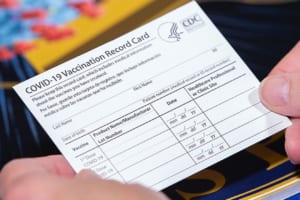The EB-5 immigrant investor regulations allow an investor to make a partial investment at the time of filing the Form I-526 and Form I-526E, Immigrant Petition by an Investor and to make the remaining investment at a later date. This is confirmed by the United States Citizenship and Immigration Services (“USCIS”) Policy Manual guidance at least with regard to the use of a promissory note in connection with the partial investment.
Under the regulations governing EB-5 investments at 8 CFR § 204.6 “Petitions for employment creation immigrants”, the clause “actively in the process of investing” appears 7 times.
(j) Initial evidence to accompany petition.
(2) To show that the petitioner has invested or is actively in the process of investing the required amount of capital, the petition must be accompanied by evidence that the petitioner has placed the required amount of capital at risk for the purpose of generating a return on the capital placed at risk. Evidence of mere intent to invest, or of prospective investment arrangements entailing no present commitment, will not suffice to show that the petitioner is actively in the process of investing. The alien must show actual commitment of the required amount of capital. Such evidence may include, but need not be limited to:
(v) Evidence of any loan or mortgage agreement, promissory note, security agreement, or other evidence of borrowing which is secured by assets of the petitioner, other than those of the new commercial enterprise, and for which the petitioner is personally and primarily liable.
If an EB-5 investor’s Form I-526 and Form I-526E, Immigrant Petition by an investor (“Petition”) includes a promissory note, it should be issued for the benefit of the New Commercial Enterprise (“NCE”) into which the investor is investing and secured with the capital, or assets, pledged for the investment, and that allows the NCE to seize, or take, the capital.
The USCIS Policy Manual provides guidance on the procedures and use of promissory notes at Volume 6 – Immigrants, Part G – Investors, Chapter 2 – Eligibility Requirements:
“A. Investment of Capital
Promissory Notes
Capital can include the immigrant investor’s promise to pay (a promissory note), as long as the immigrant investor is personally and primarily liable for the promissory note debt and his or her assets adequately secure the note. Any security interest must be perfected to the extent provided for by the jurisdiction in which the asset is located. Further, the assets securing the promissory note:
- Cannot include assets of the company in which the immigrant is investing;
- Must be specifically identified as securing the promissory note; and
- Must be fully amenable to seizure by a U.S. noteholder.
The fair market value of a promissory note depends on its present value, not the value at any different time. In addition, to qualify as capital, nearly all of the money due under a promissory note must be payable within 2 years, without provisions for extensions.”
Of the above three bullet point requirements, the third will be the most challenging for an investor and a NCE to meet. Most likely, an investor’s capital will be located outside of the U.S., creating challenges for the NCE to perfect a security interest that is enforceable by the NCE in a foreign country.
Alternatively, it can be argued that the regulations that permit an investor to be “actively in the process of investing” do not expressly require a promissory note, and additional language in the regulations suggest this to be allowed.
Under (j)(2)(iv):
“Evidence of monies transferred or committed to be transferred to the new commercial enterprise in exchange for shares of stock (voting or nonvoting, common or preferred). Such stock may not include terms requiring the new commercial enterprise to redeem it at the holder’s request;”
This clearly indicates that money (capital) can remain committed to be transferred and all capital is not required to be transferred by the time an investor files his or her I-526 Petition. This is supported by comments made by then USCIS Investor Program Office Chief Sarah Kendall at the 2019 IIUSA EB-5 Industry Forum:
“Petitioners must show actual commitment of the required amount of capital and do not need to have completed their investment before the effective date of the new rule, but may continue to be actively in the process of investing the minimum investment amount required under the current rule.”
Chief Kendall then provided an example, and concluded: “I want to emphasize, however, that investors must be eligible at the time of filing and the failure to have identified and committed the full amount of capital at the time of filing does not establish eligibility under applicable requirements.” These comments were directed at the pending increase to the minimum investment amounts to be implemented by the “EB-5 Immigrant Investor Program Modernization Rule” on November 19, 2019.
What the USCIS will consider as “committed capital” may be up for debate. An investor that chooses to make a partial investment at the time of filing his or her Petition should expect that without a promissory note, the USCIS will issue a request for evidence at the time of reviewing the investor’s Petition and request evidence of “commitment”, and at that time, the investor should be prepared to remit the remaining portion of the capital within the period of time required by the request.
ENTERLINE & PARTNERS CONSULTING
Ho Chi Minh City, Vietnam Office
Suite 601, 6th Floor, Saigon Tower
29 Le Duan Street
Ben Nghe Ward, District 1
Ho Chi Minh City, Vietnam
Tel: +84 933 301 488
Email: info@enterlinepartners.com
Facebook: Enterline & Partners – Dịch vụ Thị thực và Định cư Hoa Kỳ
Website: http://enterlinepartners.com
Manila, Philippines Office
Tel: +632 5310 1491
Email: info@enterlinepartners.com
Facebook: Enterline and Partners Philippines
Website: https://enterlinepartners.com/language/en/welcome/
Copyright 2022. This article is for information purposes only and does not constitute legal advice. This article may be changed with or without notice. The opinions expressed in this article are those of Enterline and Partners only.








